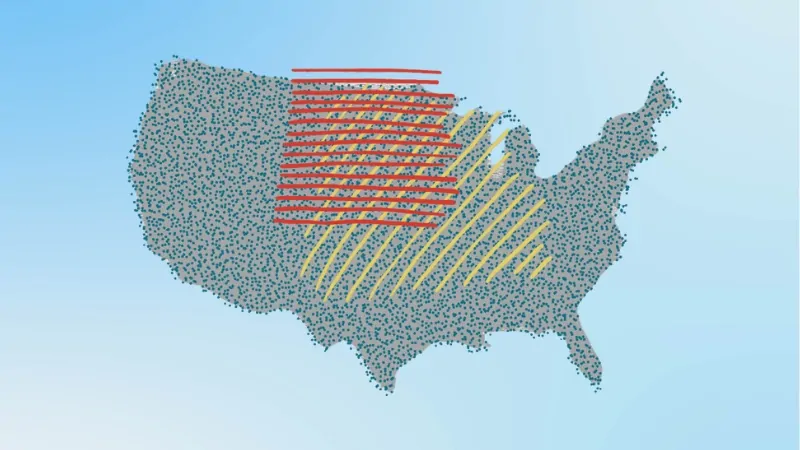Today, the leading causes of death are well-known: heart disease, cancer, chronic lower respiratory diseases, accidents, diabetes, Alzheimer’s disease, influenza/pneumonia, kidney disease, and septicemia.
For detailed data from 1981 to the present, you can query the CDC’s WONDER database. But what were the leading causes of death in the last century?
Table of Contents
Toggle1990s
In the 1990s, the leading causes of death reflected significant medical advancements and public health changes:

In the 1990s, heart disease, cancer, and stroke remained the top causes of death, reflecting the ongoing challenges of chronic diseases despite medical advancements.
HIV/AIDS emerged as a significant cause of mortality, particularly due to the AIDS epidemic, while accidents, diabetes, and chronic lower respiratory diseases also maintained high positions.
The appearance of HIV/AIDS in this period underscores the influence of emerging diseases on mortality according to CDC.
1980s
In the 1980s, the list shows the impact of emerging diseases and ongoing health challenges:

The 1980s continued to be dominated by heart disease and cancer, but the rise of HIV/AIDS dramatically reshaped health outcomes acording to this NCBI study.
As one of the deadliest pandemics in modern history, it claimed thousands of lives annually.
This decade also saw continued deaths from chronic diseases, while accidents and suicides remained consistent causes of death.
1970s
The 1970s saw the following as the main causes of death:

Heart disease, cancer, and stroke still led the list in the 1970s, but the impact of accidents and respiratory diseases began to take more prominent roles.
This decade was marked by advancements in medical technologies that helped in diagnosis and treatment, but chronic illnesses still took a heavy toll on the population as per this report.
In the 1960s
In the 1960s, the list of leading causes included:
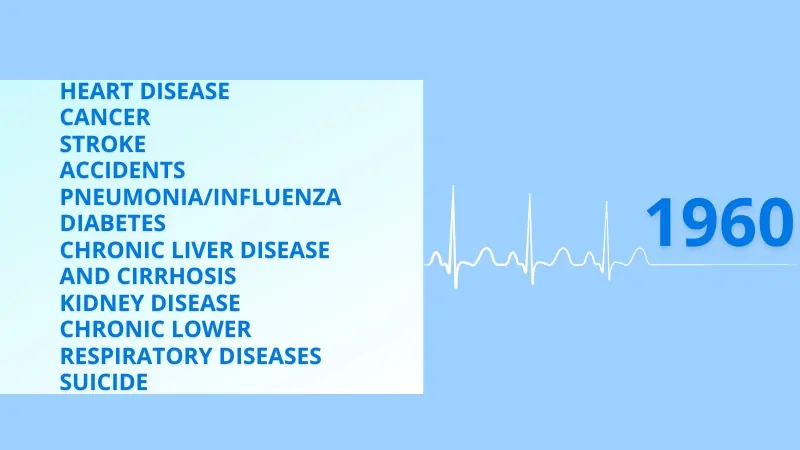
In the 1960s, similar trends persisted with heart disease and cancer as the leading causes of death.
AHA Journal notes that Pneumonia, influenza, and diabetes were also major killers during this time.
Medical care improvements during this era laid the groundwork for better management of some conditions, though many remained poorly understood or treated.
In 1950s
In 1950, the top 10 causes of death were as follows:

The 1950s saw a significant transition as infectious diseases like tuberculosis and pneumonia, which had been leading causes of death, started to decline due to antibiotic use.
Heart disease, cancer, and stroke became more prominent as public health improved and the population aged.
Between mid‐century and 1992, there was a consensus that the battle against infectious diseases had been won, and the Surgeon General announced that it was time to close the book. Experience with human immunodeficiency virus/acquired immunodeficiency syndrome, the return of cholera to the Americas in 1991, the plague outbreak in India in 1994, and the emergence of Ebola in Zaire in 1995 created awareness of a new vulnerability to epidemics due to population growth, unplanned urbanization, antimicrobial resistance, poverty, societal change, and rapid mass movement of people. The increasing virulence of dengue fever with dengue hemorrhagic fever and dengue shock syndrome disproved the theory of the evolution toward commensalism, and the discovery of the microbial origins of peptic ulcer demonstrated the reach of infectious diseases. Frank M Snowden
1940s
In the 1940s, the leading causes of death were:
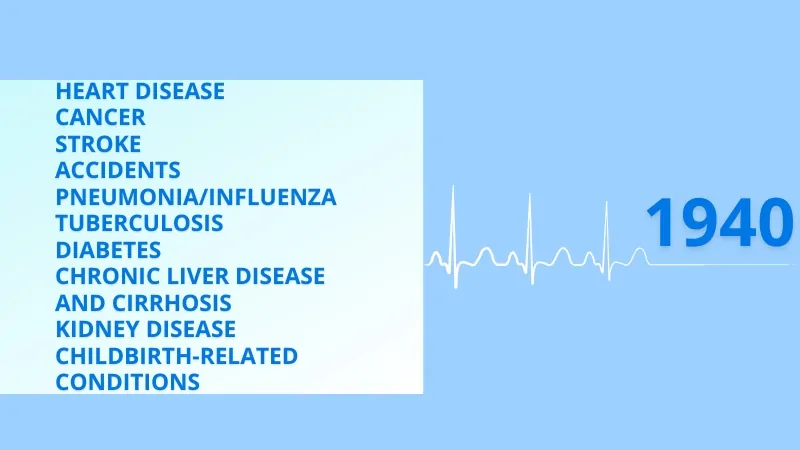
In the 1940s, World War II impacted health outcomes, but chronic diseases like heart disease and cancer were on the rise according to ScienceDirect.
Infectious diseases like tuberculosis and pneumonia were still major killers, although their rates began to fall due to better public health measures.
1930s
During the 1930s, the main causes of death were:
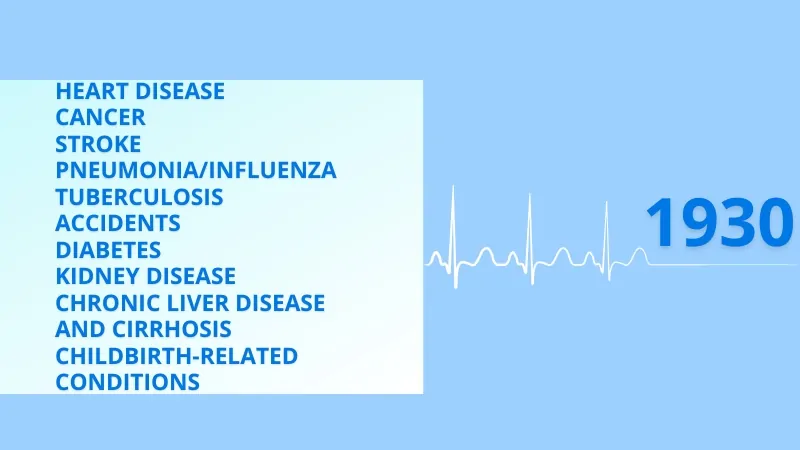
The 1930s were characterized by high mortality from heart disease, cancer, and pneumonia.
CDC also notes that the Great Depression also played a role in health outcomes due to malnutrition and poor living conditions.
The U.S. during the Great Depression, 1930s. pic.twitter.com/zjGFGsl23H
— History Photographed (@HistoryInPics) January 9, 2017
Infectious diseases like tuberculosis continued to be significant causes of death, although efforts to control them were improving
1920s
Going back to 1920, the leading causes of death were:
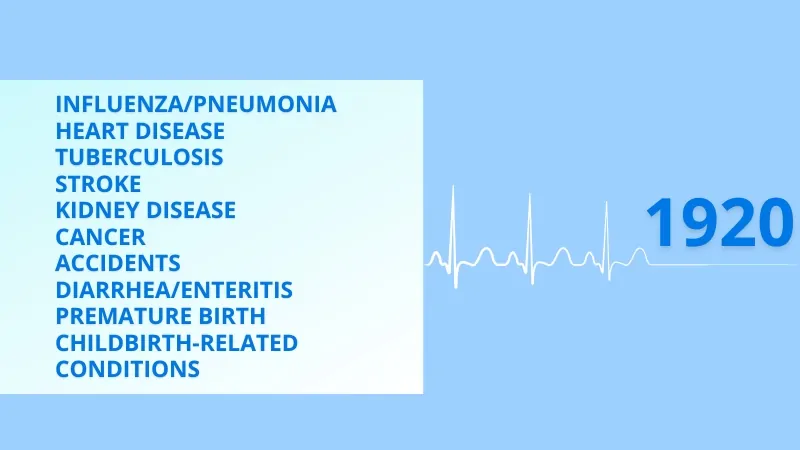
The 1920s were a time when infectious diseases like influenza, pneumonia, and tuberculosis still claimed many lives, alongside rising deaths from heart disease.
Public health efforts were in place, but widespread vaccination and antibiotics were still in their infancy.
1910s
In the 1910s, the leading causes of death included:

In the 1910s, infectious diseases like influenza, pneumonia, and tuberculosis led to the list of causes of death, especially exacerbated by the 1918 flu pandemic.
The majority of deaths during the influenza pandemic of 1918-1919 were not caused by the influenza virus acting alone, report researchers from the National Institute of Allergy and Infectious Diseases (NIAID), part of the National Institutes of Health. Instead, most victims succumbed to bacterial pneumonia following influenza virus infection. The pneumonia was caused when bacteria that normally inhabit the nose and throat invaded the lungs along a pathway created when the virus destroyed the cells that line the bronchial tubes and lungs.
Chronic conditions like heart disease were less prevalent but began to rise as overall life expectancy increased
1900s
The earliest data from 1900 show the leading causes of death as:

Infectious disease mortality in the U.S. dropped significantly during the 20th century, contributing to a marked decline in infant and child mortality and a 29.2-year increase in life expectancy.
In 1900, diseases like pneumonia, tuberculosis, and diarrhea/enteritis, along with diphtheria, were responsible for a third of all deaths, with 40% occurring in children under 5 years old as per a PubMed study.
By 1997, the leading causes of death had shifted to heart disease and cancer, accounting for over half of all deaths.
Meanwhile, infectious diseases like pneumonia and HIV were responsible for just 4.5% of deaths. The volatility of infectious diseases is illustrated by the 1918 influenza pandemic, which caused 20 million deaths globally, including 500,000 in the U.S., and the ongoing HIV pandemic, first identified in 1981, which has led to 13.9 million deaths worldwide
Final Thoughts
Understanding the historical leading causes of death provides valuable insights into the progress of medical science, public health advancements, and societal changes over the past century.
From the early 1900s, when infectious diseases like influenza, tuberculosis, and diphtheria were predominant, to the late 20th century, when chronic conditions such as heart disease and cancer became the leading killers, these shifts highlight the evolution of healthcare challenges and achievements.
References
- 1900-1940 tables ranked in National Office of Vital Statistics, December 1947
- Ghosh AK. Four decades of continuing innovations in the development of antiretroviral therapy for HIV/AIDS: Progress to date and future challenges. Glob Health Med. 2023 Aug 31;5(4):194-198. doi: 10.35772/ghm.2023.01013. PMID: 37655189; PMCID: PMC10461327.
- Title: Leading causes of death, 1900-1998 Corporate Authors(s) : National Center for Health Statistics (U.S.) Published Date : 9/17/2001 URL : https://stacks.cdc.gov/view/cdc/53236
- Snowden FM. Emerging and reemerging diseases: a historical perspective. Immunol Rev. 2008 Oct;225(1):9-26. doi: 10.1111/j.1600-065X.2008.00677.x. PMID: 18837773; PMCID: PMC7165909.
- Olivier Allais, Guy Fagherazzi, Julia Mink, The long-run effects of war on health: Evidence from World War II in France, Social Science & Medicine,
Volume 276, 2021, 113812, ISSN 0277-9536, https://doi.org/10.1016/j.socscimed.2021.113812. - Centers for Disease Control and Prevention (CDC). Control of infectious diseases. MMWR Morb Mortal Wkly Rep. 1999 Jul 30;48(29):621-9. PMID: 10458535.




